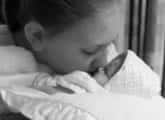There are moments in our lives that help define the rest of our existence because of their profound impact. Corrine’s birthday (December 17, 2011) is one of those moments. We experienced both the birth and the death of our fourth child, Corrine Catherine Stryker within the span of 90 minutes. Corrine was diagnosed at 20 weeks with a brain and heart abnormality and was given a label I had never heard before, “incompatible with life”. The day of Corrine’s diagnosis was one of the hardest days of our family’s life. We left feeling devastated, fearful, overwhelmed and confused with the information being given to us by the medical professionals. The first few days of conversation with the radiologist and perinatologist centered around “options” that we quickly realized were no longer referring to the well being of our child. Rather, these “options” only dealt with my pregnancy itself as a condition requiring intervention and the possible termination of her life. Fortunately, Corrine’s story did not end there at the worst possible time when we felt the most vulnerable and confused. Speaking with many women who experienced poor prenatal diagnosis I realized that abortion is routinely the first option offered for fetal defects “incompatible with life” as well as for virtually all disabling conditions. Why are so many people fearful of these children? I believe it is because the fear is steeped in lack of unabridged truth and the perpetuation of misinformation. These “terminations” and “inductions” are routinely carried out in many of our hospitals and not only in the much publicized and maligned abortion clinics around the country. This reality is heart wrenching when you realize that by the time many of these diagnosis are made during a routine ultra sound (18-22 weeks), mothers like myself have already felt their baby move and spent weeks planning and dreaming of this new addition to their family. We chose to continue to parent Corrine even after receiving the news that our child was very sick and may not be with us for long. We were fortunate enough to already have the knowledge of other “options” that did not include the termination of our child as a treatment. My obstetrician, Dr. John Bruchalski from Tepeyac Family Center in Fairfax often says “Hate the disease…love the patient”. Tepeyac Family Center affirmed Corrine’s dignity as our unborn child through their words and actions and helped us continue to parent our baby to the best of our ability through decisions we would make in the upcoming months.. Perinatal hospice services (available to all women regardless of income), coordinate visits with healthcare providers like neonatologists to discuss the palliative care of these children taking into account several different outcomes. Being well informed is vital towards gaining acceptance of the life their child will lead. Parents experiencing a poor prenatal diagnosis are better served if there is more support for welcoming every life as a gift where the least can be welcomed no matter what the cost. Perinatal hospice also offers comfort and mentoring to those who struggle with their own feelings of discomfort surrounding disability and death. We all wished we had more than 90 minutes with Corrine but our initial fears that Corrine would unduly suffer while we watched were unfounded. I believe our birth announcement was a testament to this fact. December 17, 2011 we were given the blessing of Corrine Catherine’s miraculous birth at 12:27pm. She was 4lbs 13oz and 18 3/4 inches long. Corrine was born strong and beautiful letting out a powerful cry that her mother and father will never forget. Corrine Catherine shared her special grace with all of her family giving each of us special moments and memories that we will always treasure. She was given her first bath by her grandmothers and adorned in her baptism gown. While being passed around in loving arms her sweet baby sounds warmed everyone’s hearts. After one final loving embrace by her mother, Corrine Catherine peacefully fell asleep for her final rest. Our family and entire community were impacted by the experience of welcoming Corrine Catherine unconditionally. We were transformed by the experience of embracing life without putting expectations or limits on her value. Her frailty said something to all of us about what it meant to be vulnerable. Our children were an amazing witness to everyone they encountered during their time with their sister. Their ability to see past her disabilities and embrace her as their sister was profound. I realized that they saw their own lives through her frailty and weaknesses. Our devotion to a child who was brought into this world not because of what she could do for us but for the dignity she brought simply as a human being and member of our family emphasized to them their own worth despite their own imperfections. They know now more concretely the unconditional love we have for each of them and that their worth is not predicated by their looks or accomplishments. As a society we should be supporting each other in difficult situations. This support should not be provided in the form of assistance to prematurely end the life of “the least among us”. It is time to end perhaps the last socially acceptable form of prejudice. Paula and Richard Stryker




